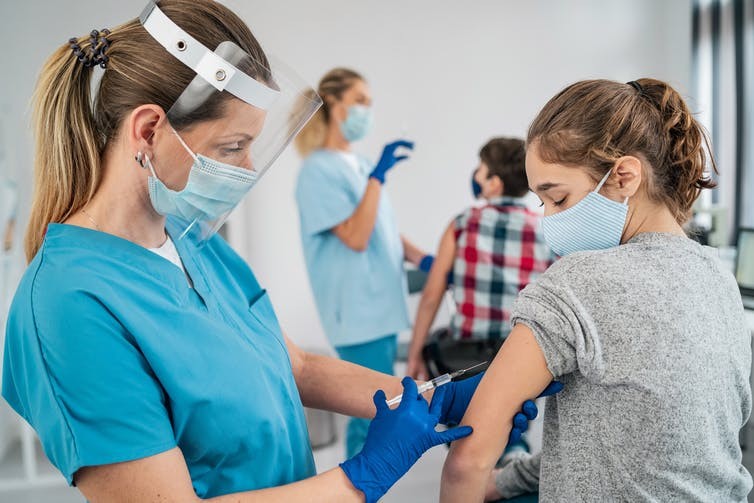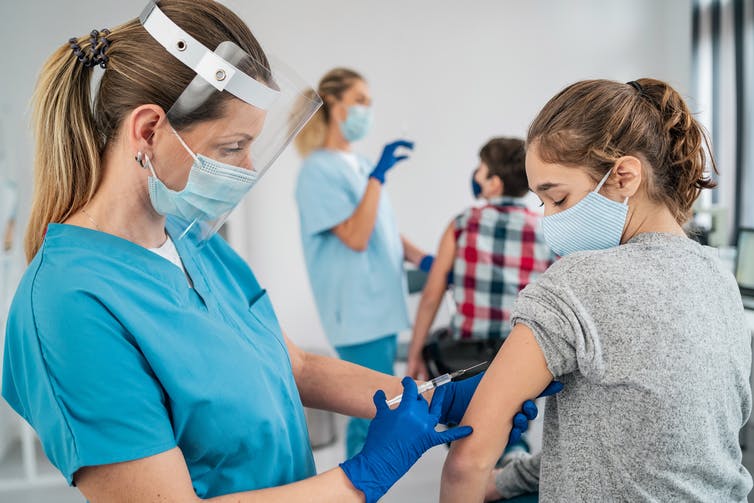February 1, 2022

Your Health Means Everything: Protect It with Immunizations
by Jeannine Blakley, CPNP, Pediatrics

If a researcher were to sit down at the end of 2021 and tabulate and record the number of times individual key words were mentioned over the course of the year, “vaccine” would surely be near the top. The advent of COVID-19 vaccines and the key role they have played in slowing the spread of the virus and helping us get closer to pandemic’s end has not only been at the forefront of global discourse but has also served as a reminder of how effective vaccination – or immunization, as it is also known – can be in protecting us from a number of illnesses both mild and severe.
Of all the things we have learned throughout this historic time, the one fact that perhaps can have the farthest-reaching impact for each of us individually and collectively is that our health means everything. It has always been true but perhaps never truer than now. We have been reminded of how fragile our health can be and how essential it is to do all that we can to protect it so that we can enjoy the things we love and take advantage of all that life has to offer.
One of the safest and most effective ways we can protect not only our health but the health of others is by getting vaccinated against preventable diseases. Immunizations are recommended for all ages, from birth through senior adulthood. Following recommended vaccination schedules can help ensure that you and your family stay healthy and protected from preventable serious disease. And it helps make your community healthier too, by reducing the spread of infectious illness.
August is National Immunization Awareness Month and a time when many of us are gearing up for another school year – perhaps in person for the first time since spring of 2020. So, it’s a perfect time to check your child’s immunization record, make sure they’re up to date on recommended vaccines and make an appointment with their pediatrician to make up for any that are missed. And while you’re checking on theirs, don’t forget to double check yours, too. Adults can benefit from vaccines as well, including some that can help prevent illnesses like shingles, hepatitis A and B, and certain cancers that can result from disease infection. Below is a quick, at-a-glance breakdown of recommended vaccinations for different ages.
Birth, 1-2 month and 6-18 months (3 doses)
Hepatitis B
2, 4 and 6 months (3 doses)
RV (Rotavirus)
6 months and up
Influenza (yearly)
2, 4, 6-18 months and 4-6 years (4 doses)
IPV (Polio)
2, 4, 6 and 12-15 months (4 doses)
Hib (Haemophilus influenza type B)
PVC13 (Pneumococcus)
12-15 months and 4-6 years (2 doses)
MMR (Measles, mumps and rubella)
Varicella (Chickenpox)
12-23 months (2 doses)
Hepatitis A
2, 4, 6, 15-18 months and 4-6 years (5 doses)
DTAP (Tetanus, diphtheria and whooping cough)
11-12 years
HPV (Human papillomavirus) (2 doses)
Tdap (DTaP booster)
MenACWY (Meningococcal disease)
16-18 years
MenACWY (booster)
15 years and up (a good rule of thumb is to get a booster on the “5”s – 15,25,35, etc.)
Tdap or td (Booster every 10 years)
50 years and up
Zoster recombinant (Shingles)
65 years and up
PPSV23 (Pneumococcus)
Recommended vaccinations for children and adults alike may alter depending on factors like health conditions, lifestyle and other characteristics, so it’s important to maintain a good dialogue with your primary care provider and pediatrician on which immunizations you and your family should receive and when. And if you’re an adult who may have missed some of the recommendations above, you may be able to get catch-up immunizations. Check with your provider about what’s right for you.
If you have not yet received your COVID-19 vaccine, please consider doing so. Pfizer and Moderna COVID-19 vaccines (2 dose regimen) and the J&J COVID-19 vaccine (1 dose) are authorized for ages 18 and up, and the Pfizer vaccine (2 dose regimen) is authorized for ages 12 and up. If you are female and between the ages of 18-50, the J&J vaccine is accompanied by a rare but increased risk of thrombosis with thrombocytopenia syndrome (TTS). Talk with your provider about the right COVID-19 vaccine for you.
Our health means everything, and immunizations can have tremendous benefits when it comes to protecting your health and that of your family and community. Make sure you’re up to date on yours today. For more information on immunizations recommendations by age, visit www.cdc.gov/vaccines.
If you would like to speak with a provider about your or your child’s immunizations, call 800.424.DOCS or visit the Find a Provider page to make an appointment and get connected with the care you need.
